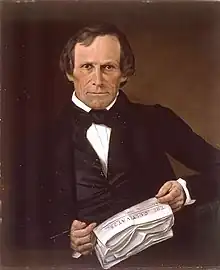Isaac Hill | |
|---|---|
 | |
| United States Senator from New Hampshire | |
| In office March 4, 1831 – May 30, 1836 | |
| Preceded by | Levi Woodbury |
| Succeeded by | John Page |
| 16th Governor of New Hampshire | |
| In office June 2, 1836 – June 5, 1839 | |
| Preceded by | William Badger |
| Succeeded by | John Page |
| Member of the New Hampshire House of Representatives | |
| In office 1826 | |
| Member of the New Hampshire Senate | |
| In office 1 820–1823 1827–1828 | |
| Personal details | |
| Born | April 6, 1788 Cambridge, Massachusetts |
| Died | March 22, 1851 (aged 62) Washington, D.C. |
| Political party | Democratic-Republican Democratic |
| Occupation | Newspaper editor, politician |
| Signature | |
Isaac Hill (April 6, 1788 – March 22, 1851) was an American politician, journalist, political commentator and newspaper editor who was a United States senator and the 16th governor of New Hampshire, serving two consecutive terms.
Hill was born on April 6, 1788, in West Cambridge, Massachusetts, (now Belmont), shortly after the American colonies had won their independence from Great Britain. Born into a relatively poor family, his parents were Isaac and Hannah (Russell) Their marriage brought nine children, with Isaac being the eldest of the siblings. He was a member of the Democratic Party and supported the policies of President Andrew Jackson, while he was a bitter political opponent of President John Quincy Adams.
He also supported John C. Calhoun for the presidency in 1844.[1] Hill's caustic newspaper editorials were the source of much political controversy among political parties and cost him a nomination to the Senate, but he later won a second nomination and was elected Senator of New Hampshire in 1820, ultimately serving for two terms. Hill was also a successful speculator in the railroad business, real estate, banking and various manufacturing enterprises.
In the latter part of his life Hill became active in other ventures including railroads, real estate, banking and manufacturing enterprises and became moderately wealthy and accumulated a considerable estate. He was active in the promotion of various agricultural improvements. In his last years Hill suffered constantly from asthma. Hill died on March 22, 1851, in Washington, D.C.,[2][3][4] and was buried at Blossom Hill Cemetery in Concord, New Hampshire.[5] The town of Hill, New Hampshire, is named after him.[6]
See also
Citations
- ↑ Schlesinger, 1953, p. 104
- ↑ Webster, 1998, p. 219
- ↑ Ashworth, 1983, p. 258
- ↑ Ashworth & Coffey, 2004, p. 123
- ↑ Spencer, 1998, pp. 134, 423
- ↑ Capace, 2001, p. 448
Bibliography
- Ashworth, John (1983). 'Agrarians' and 'Aristocrats': Party Political Ideology in the United States, 1837-1846. Cambridge University Press. p. 258. ISBN 978-0-5213-3567-6.
- Bradley, Cyrus Parker (1835). Biography of Isaac Hill (PDF). John F. Brown.
- Capace, Nancy (2001). Encyclopedia of New Hampshire. Somerset Publishers. ISBN 978-0-4030-9601-5.
- Heffernan, Nancy Coffey; Stecker, Ann Page (2004). New Hampshire: Crosscurrents in its Development. p. 123. ISBN 9781584653943.
- Corps, Terry (2009). The A to Z of the Jacksonian Era and Manifest Destiny. Scarecrow Press. ISBN 978-0-8108-7016-1.
- Cutter, Benjamin; Cutter, William Richard (1880). History of the Town of Arlington, Massachusetts. p. 260.
- Hurd, Duane Hamilton (1890). History of Middlesex County, Massachusetts. Vol. 3.
- Marquis, James (1938). The life of Andrew Jackson, complete in one volume. Indianapolis, New York, The Bobbs-Merrill company.
- Polk, James Knox (1983). Correspondence of James K. Polk: 1842-1843. Univ. of Tennessee Press. ISBN 978-0-8265-1211-6.
- Schlesinger, Arthur M. (1953) [1945]. The Age of Jackson. Boston, MA: Little, Brown and Company. ISBN 978-0-3167-7343-0.
- Dumas Malone, ed. (1932). Dictionary of American biography. Vol. IX. New York: Charles Scribner's Sons.
- Dumas Malone, ed. (1932). Dictionary of American biography. Vol. XIII. New York: Charles Scribner's Sons.
- History of Bedford, New Hampshire. Rumford Printing Company. 1903.
- Spencer, Thomas E. (1998). Where They're Buried. Baltimore, Md. : Clearfield Co. ISBN 9780806348230.
- Webster, Daniel (1986). The Papers of Daniel Webster: 1798-1824. ISBN 9780874513233.
- Edwards, B. B.; Cogswell, W., eds. (November 1840). "History of Newspapers in New Hampshire". The Quarterly Register and Journal of the American Education Society. American Education Society. 12–13.
External links
- United States Congress. "Isaac Hill (id: H000593)". Biographical Directory of the United States Congress.
- Cyrus Parker Bradley, Biography of Isaac Hill, of New-Hampshire, 1835
- Isaac Hill at Find a Grave. Retrieved January 13, 2014.
- "Isaac Hill". Appletons' Cyclopædia of American Biography. Vol. 3. Retrieved May 29, 2020.

